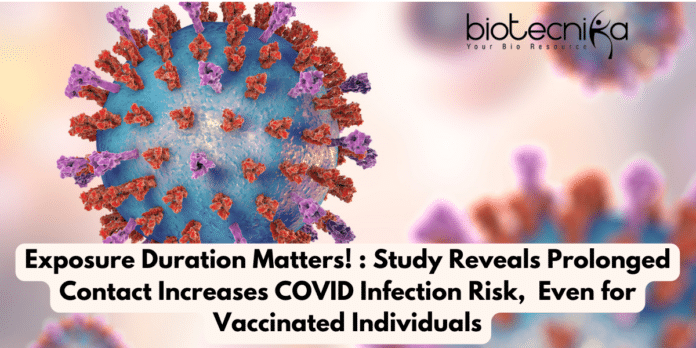Increase in COVID Infection! Prolonged contact with someone infected with COVID-19, whether you’ve had the disease or been vaccinated, heightens the risk of catching the virus, warns a recent study published in Nature Communications.
This groundbreaking research sheds light on the strong link between exposure duration and infection susceptibility, underlining the need for precautionary measures. Let’s dive into the study’s findings, their implications, and how they align with our current understanding of the pandemic. The study, conducted by researchers from Yale University, examined the relationship between the extent of exposure to the SARS-CoV-2 virus and the likelihood of infection, irrespective of an individual’s vaccination status. While this connection has been speculated before, this study provides solid evidence of the correlation. The data highlight the critical role of protective measures, such as mask-wearing and improved ventilation, in reducing exposure risks.
Importance of Exposure Reduction: Akiko Iwasaki, an immuno biologist from Yale University, emphasizes the significance of these findings. She explains that while the correlation seems intuitive, the study’s results now provide concrete evidence that these preventive measures play a pivotal role in supporting the effectiveness of vaccine-mediated immunity. Scientific communities have long suspected that the amount of virus exposure impacts the likelihood of infection.
However, quantifying this relationship has been challenging due to the complexities of tracking close contacts and infections. To tackle this, the study focused on 13 correctional facilities in Connecticut. By conducting regular tests on residents without symptoms, the researchers were able to categorize exposure levels into ‘close exposure,’ ‘moderate exposure,’ and ‘no documented exposure.’ Data and Analysis: Analyzing data from over 10,000 residents and several SARS-CoV-2 infections, the study revealed intriguing patterns.
Individuals with no documented exposure or only moderate exposure were found to be better protected by vaccination or previous infection. However, neither of these factors, nor their combination, offered substantial protection to those with close exposure. This indicates that the duration of exposure plays a significant role in infection risk. The study’s conclusions align with earlier research on ‘superspreader’ events by scientists like Jose-Luis Jimenez from the University of Colorado, Boulder. Such research showed that the time spent in contact with a COVID-19 carrier directly influences the chances of infection. Additionally, new viral variants and diminishing vaccine immunity contribute to an individual’s risk, but these are factors often beyond our control.
Taking Control for Increase in COVID Infection: Margaret Lind, an epidemiologist from Yale University, emphasizes the adjustable nature of exposure risks. While certain risk factors are beyond our control, such as emerging variants and waning immunity, we can actively manage our risk by following simple measures like wearing masks and avoiding crowded places. These actions, as indicated by the study, could be the key to minimizing exposure and subsequent infection.
The recent study brings us closer to understanding the intricate relationship between exposure duration and COVID-19 infection risk. By heeding the findings and implementing preventive strategies, we have the opportunity to take charge of our health and contribute to collective efforts in curbing the spread of the virus.






























